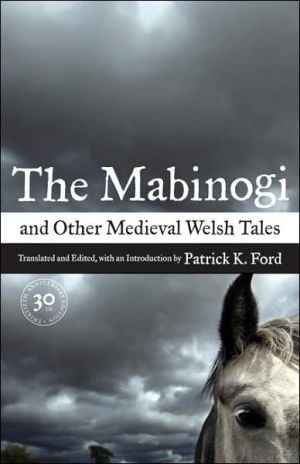

 |

|

The average rating for The Mabinogi and Other Medieval Welsh Tales based on 2 reviews is 4.5 stars.
Review # 1 was written on 2008-01-31 00:00:00 William Foist William FoistThe Mabinogi are four linked medieval Welsh tales; Pwyll, Prince of Dyfed, Branwen daughter of Llyr, Manawydan son of Llyr, and Math son of Mathonwy. Other tales are included in this volume, which represents the core of Welsh mythology. Each story is prefaced with a plain-English summary, then the story is presented as originaly written (the editor, Patrick K. Ford, did the translating). There is a handy glossary of names, a pronunciation guide, and an index of names at the back of the book. These tales are full of magic, humor, and pathos. It is a great introduction to Welsh mythology. I liked this translation better than the Jeffrey Gantz one. Some of the repetitiveness in Culhwch and Olwen irked me, because it started out funny but then dragged on. I'm not one to read poetry, so much of the Gwion Bach and Taliesin story wasn't interesting to me, but those are the book's only drawbacks in my opinion. Overall, the book is worth reading just for the Mabinogi. All four of those stories were great. I especially enjoyed Manawydan son of Llyr. I won't spoil the story, but I found it extremely funny when different people came by and tried to talk Manawydan out of hanging a mouse (for thievery) by stringing it up between two forks stuck in the ground! |
Review # 2 was written on 2018-01-16 00:00:00 James Allport James AllportThis is an excellent translation of the Four Branches of the Mabinogi, of the Arthurian "Culhwch and Olwen," and "The Dream of Rhonabwy," and two shorter tales, plus the rarely-translated "Taliesin." It omits the three "romances," Welsh retellings of the Old French works of Chretien de Troyes, which probably had Celtic, even Welsh, origins, at some considerable remove, so it may not be suitable to someone interested only in the Arthurian material. Taliesin was brought into close connection to Arthur in the poems of Charles Williams, greatly admired by C.S. Lewis, but this isn't an essential part of his story. In fact he was probably a later historical figure, although you wouldn't guess it from the story here (which Patrick Ford, the translator, divides into two, following manuscript precedents. For more detail, see my review at |
CAN'T FIND WHAT YOU'RE LOOKING FOR? CLICK HERE!!!